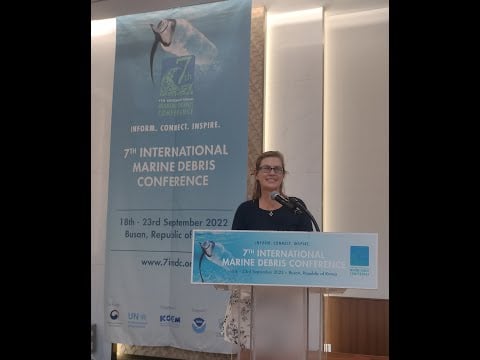
My name is Heidi Tait, and I am the founder and CEO of Tangaroa Blue Foundation.
For more than 18 years, Tangaroa Blue Foundation has coordinated the Australian Marine Debris Initiative (known as the AMDI), creating a national network for citizen scientists, organisations and partners to collaborate on the removal and prevention of marine debris from our ocean ecosystems.
The evidence provided by the AMDI network has influenced the narrative and focus on marine debris within Australia, from a marginal issue to its recognition as a national and international threat that requires urgent action, as recognised by the passing of the United Nations resolution to create a legally binding Plastics Treaty by 2024.
Individuals and organisations across Australia continue to support the AMDI Database, which now contains over 21 million items of marine debris that has been removed from our environment and systematically recorded through a collaboration of over 2000 partner organisations at 4500 clean-up sites. More than 215,000 volunteer opportunities have contributed $24 million dollars of in-kind effort into solving the marine debris issue. Evidence from the AMDI has been used in the implementation and monitoring of over 300 source reduction projects that aim to stop the flow of marine debris at the source.
With 18 years of baseline data collated from across Australia, the AMDI Database remains the largest single source of information on marine debris in the southern hemisphere. The database has informed decision making at all levels of the Australian Government and continues to be a trusted source of independent data and knowledge for decision makers, researchers and local communities.
The recent Australian Government’s investment of $1.75 million into a national marine debris database and encouragement of citizen scientists to contribute, acknowledges the key role that citizen scientists play as part of the solution and is the basis for Tangaroa Blue to develop the AMDI almost two decades ago.
We are encouraged by the Australian Government’s acknowledgment of the critical importance of addressing the marine debris issue, the need for a national coordinated response and the important role that citizen scientists play in delivering targets aligned with national and state plastics plans.
Tangaroa Blue Foundation remains committed to developing and expanding the AMDI, with continuing upgrades and investment. This includes the AMDI Monitoring Methodology manual for different types of locations, resulting from extensive consultation with expert partners from 3 universities. The Improved AMDI Database website and IOS and Android data collection apps are also planned for release by the end of 2022, increasing engagement with the database and the ease in which citizen scientists can enter and access data.
The AMDI Database team will continue to provide independent, custom datasets for all levels of Government to assist in guiding evidence-based policy, and to monitor the impact of source reduction strategies.
We are excited to introduce our upgraded AMDI Database platforms to our AMDI network and we look forward to linking the AMDI even further, including supporting the United Nation’s Plastic Treaty. We will continue to work with the hundreds of thousands of citizen scientists into the future on reaching a shared mission of cleaner and healthier oceans.
For more information about the AMDI and partnering opportunities please connect to us through the Tangaroa Blue website or our social media platforms.
Thank you






